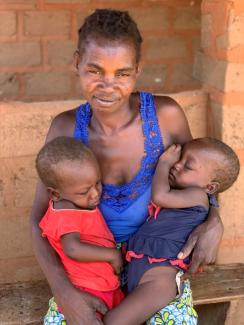Nourishing the Future by Transforming Nutrition in Mozambique
Maria Pastola, a mother of eight children from the district of Meconta, in the center of Mozambique, became concerned when her newborn twins failed to grow. “My children were very thin, had brown hair, and wouldn’t fill up the cloth when I carried them on my lap,” she recalls. “I had already lost hope, I thought they might die.”
Maria’s children were not getting the right nutrition - a serious problem since poor diet in early childhood has a lifelong impact on a child’s development. That is why USAID works through local organizations in Mozambique’s poorest provinces to promote better nutrition and hygiene, helping families raise healthier and stronger kids.
Things changed for Mary when a neighbor told her about a nutrition center in Meconta. Maria went to the center and met with Dolores, a community member trained by ADPP to provide family care assistance.
Empowerment through Education
After Maria shared her concerns, Dolores arranged a visit to meet with Maria’s husband and children in their home. Dolores told her that the twins were severely underweight and asked Maria about her own diet. She encouraged Maria to participate in a cooking group, where she learned how to prepare healthy meals for her family. “I learned to enrich porridge with peanuts, coconut, eggs, cassava leaves [and] carrots,” she reported. After Maria changed the way she fed her family, she began to see her twins thrive. Looking back over the past two years, Maria is elated. “If it wasn’t for USAID’s help, I would have lost my children to malnutrition,” she says.

Primary TextIf it wasn’t for the Transform Nutrition project, I would have lost my children to malnutrition
Secondary TextMaria Pastola
By the People, For the People (De Povo, Para Povo)
In 2019 USAID partnered with local organization, Ajuda de Desenvolvimento de Povo para Povo (ADPP), to implement the five-year Transform Nutrition (TN) project in the 12 neediest districts of Nampula, a province in northern Mozambique. TN works through government structures to support public access to nutrition, sanitation, hygiene skills and services. The program develops education campaigns to help people learn healthy nutrition habits.
Transforming Tradition
Dispelling traditional myths is a major component of TN’s educational activity. Amina Acbar, a 38 year old mother of nine children, had many misconceptions about prenatal and infant nutrition. She believed that newborns should drink water and that lactating women should avoid eating eggs. “Before the project I didn’t know that a child can grow well taking only breast milk until six months of age [and] while I am pregnant I should feed myself well,” she said. Amina was pregnant with her ninth child when she began participating in TN activities in her district of Namapala. By the time she gave birth, she knew how to provide adequate nutrition for herself and her newborn.
Amina also learned how to improve her food safety practices. Previously, she did not wash with soap, her dishes were kept on the floor, and she had no place to dispose of her garbage. Through the TN program she learned to build a tip tap for washing, a canopy for storing clean dishes, and a landfill where she could safely dispose of her garbage. “Since I started participating in the project, I’ve noticed my family and I get sick less often and we rarely go to the hospital,” she notes. By changing her approach to sanitation and hygiene, she transformed her health and the health of her family.


About this story
In Mozambique, about one-third of the population is chronically food-insecure. Inadequate food intake, low nutrient and protein dense diets, and poor infant and child feeding practices are all at the crux of this national issue. These problems are compounded by widespread misinformation regarding safe and necessary nutrition for lactating women, infants and young children. In Nampula, Mozambique’s largest and most densely populated province, more than half of all children under the age of five are stunted, making it the hardest hit province in the country.

